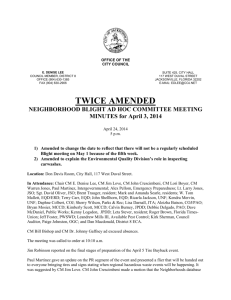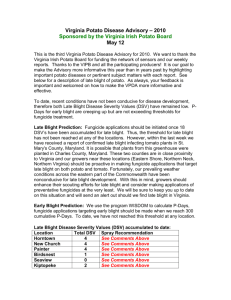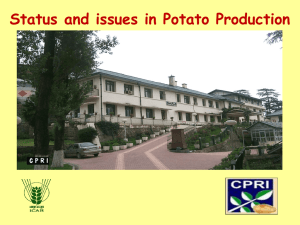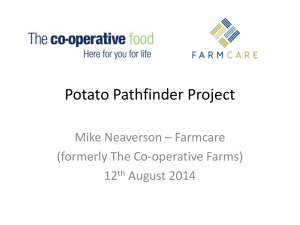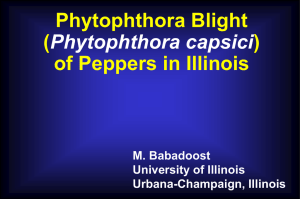Late Blight 2011
advertisement
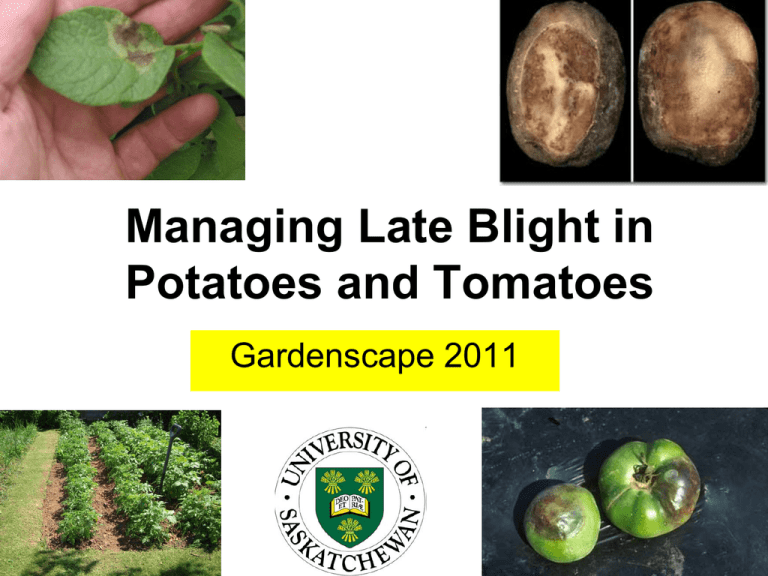
Managing Late Blight in Potatoes and Tomatoes Gardenscape 2011 Late Blight • Fast moving fungal disease attacks members of the Solanaceae family • Sensitivity – Tomato + potato > eggplant and pepper • Damages leaves + stems = reduced yields • Infects tubers and fruit = storage decay Late Blight in History Late Blight on the Prairies • Relatively rare problem .. Primarily because “typical” Prairie summer conditions (hot and dry) are not conducive to the development and spread of Late Blight 2010 • Late Blight widespread across N. America • Widespread across SK by July • Hits commercial potato growers as well as backyard gardens • Many backyard gardens wiped out. • Commercial growers – mixed bag … even with advance warning and $$$ spray programs Why so much Late Blight in 2010? Why so much Late Blight in 2010? 2009 - blight widespread across eastern N. America - blight blows into SK late in the season - causes minor crop loss due to late arrival - but did it get into the seed potatoes? Why so much Late Blight in 2010? 2010 - planted seed contaminated with blight ?? + - ideal weather for development and spread of blight (cool, windy and wet) So, what about 2011? So, what about Blight in 2011 ? Pathogen - Only way late blight can overwinter in SK is infected potato tubers - Disease carries into next year if .... a) diseased tubers discarded as culls manage to sprout b) diseased tubers used as seed Managing Blight in Potatoes in 2011 ? Pathogen Diseased seed - heavily infected tubers ... - easy to detect and discard - will likely rot after planting = no spread - may spread spores to otherwise healthy seed at cutting time Managing Blight in Potatoes in 2011 Pathogen Diseased seed - Lightly infected tubers ... - infected late in fall or at cutting time - no visible signs of rot - will likely sprout and develop into diseased plant = starting point of field infection Al-Mughrabi - 2010 Managing Blight in Potatoes in 2011 Managing the Pathogen - Plant certified seed ... but even the commercial seed growers struggled to keep blight under control in their crops in 2010. - Ask your supplier about Blight pressure and their blight management program in 2010 - Check the seed carefully yourself Managing Blight in Potatoes in 2011 Host - Cultivar sensitivity Sensitive – all reds, Shepody Moderate – Norkotah, Burbank, Yukon Gold Tough – Alpine, Classic, Milva, Yukon Gem Shepody Y. Gold Burbank Milva Research Supported by ADF Managing Blight in Potatoes in 2011 Managing the Pathogen Warming seed prior to planting = ideal conditions for spore formation of Blight Hold seed cold until planting Disinfect cutting equipment/surfaces regularly Cut “problem” seed lots last So, what about Blight in 2011 ? Managing the Pathogen Scout field ... starting at emergence “When in doubt ... Pull it out” Managing Blight in Potatoes in 2011 Managing the Environment - Avoid high risk fields in 2011 - low spots - spots with poor air movement - proximity to problems ??? - What’s going on next door ? Managing Blight in Potatoes in 2011 Managing the Potato Crop Wider spacing = more air flow = dry canopy Avoid excess N fertility and water … as bushy plants = wet canopy Water early in the day so canopy dries before nightfall Water hills … not the foliage Managing Blight in Potatoes in 2011 Managing the Potato Crop Good soil coverage minimizes infection of the tubers - gradually build a deeper than normal hill - re-hill following heavy rain - tubers set high in the hill = high risk Managing Blight in Potatoes in 2011 Sprays to Manage Late Blight ? Limited options available to gardeners Copper spray (Bordeaux) Need to be applied preventatively = BEFORE the BLIGHT ARRIVES Need complete coverage of foliage Need to cover both leaf surfaces Need to re-apply as crop grows and after every rain/irrigation event Managing Blight in Potatoes in 2011 Managing the Potato Crop Harvest after vines are dead/dried/removed Grade out suspect tubers going into storage ** If more than 5% of tubers rotten … Forget About Storage Store cool (4-6C) and dry Inspect frequently (visual + sniff test) and re-grade Managing Blight in Tomatoes in 2011 ** Late Blight cannot be transmitted or carried over on tomato seed ** Late Blight can be introduced on transplants Some cultivars more Blight resistant - Juliet (Ve) and Santa (grape types) - Legend (T+M) (standard type) - Defiant (J) (standard type) Managing Blight in Tomatoes in 2011 Many of the same management recommendations as for potatoes … Site selection Fertility and water management Row spacing + …. - prune and stake to further improve air flow Protective spraying Managing Blight in Tomatoes in 2011 Protected cultivation - Late Blight not a problem in greenhouses as do not have continuous wet foliage Managing Blight in Tomatoes in 2011 At harvest time … - Blight risk increases in fall due to higher RH and cooler temps + big canopy - consider benefit vs cost of harvesting mature green - keep harvested tomatoes separate during ripening + regrade frequently - grow to love green tomato pickles Future ... 2011 will be a challenging year as ... - commercial seed system is not free of late blight - many backyard potato growers save seed for replanting = 10,000 starting points across SK? - backyard gardeners still unfamiliar with blight and blight management Future ... If ... - 2011 is hot and dry - we educate ourselves on blight management It is possible that Late Blight may “recede” through 2011 ... and by 2012 or 2013 we will be back to “normal” If not ..... If it keeps raining ...
